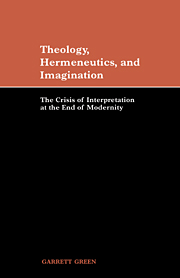Book contents
- Frontmatter
- Contents
- Preface
- 1 Theological hermeneutics in the twilight of modernity
- Part I The modern roots of suspicion
- 2 The scandal of positivity: the Kantian paradigm in modern theology
- 3 Against purism: Hamann's metacritique of Kant
- 4 Feuerbach: forgotten father of the hermeneutics of suspicion
- 5 Nietzschean suspicion and the Christian imagination
- Part II Christian imagination in a postmodern world
- Appendix: Hamann's letter to Kraus
- Bibliography
- Index
2 - The scandal of positivity: the Kantian paradigm in modern theology
Published online by Cambridge University Press: 22 September 2009
- Frontmatter
- Contents
- Preface
- 1 Theological hermeneutics in the twilight of modernity
- Part I The modern roots of suspicion
- 2 The scandal of positivity: the Kantian paradigm in modern theology
- 3 Against purism: Hamann's metacritique of Kant
- 4 Feuerbach: forgotten father of the hermeneutics of suspicion
- 5 Nietzschean suspicion and the Christian imagination
- Part II Christian imagination in a postmodern world
- Appendix: Hamann's letter to Kraus
- Bibliography
- Index
Summary
I have found it necessary to deny knowledge, in order to make
room for faith.
Kant… Kant (in the end, an underhanded Christian) …
NietzscheThe opening chapter introduced the crisis of interpretation faced by theology in late modernity, first by demystifying the rather intimidating term hermeneutics and then by placing the problem of scriptural interpretation in cultural and historical perspective. I also invoked Paul Ricoeur's suggestive thesis about the “hermeneutics of suspicion”: that sea-change in the way we read authoritative texts that Ricoeur associates with the “masters of suspicion,” Marx, Nietzsche, and Freud. Starting in this chapter I want to step back in time to the eighteenth century, when the modern age was young, in order to explore the origins of the problems that confront us now, in the “twilight” of modernity. The protagonist (perhaps it would be more accurate to say the villain) will be that great philosopher of the modern age, Immanuel Kant; and the key term will be one unfamiliar to late twentieth-century ears, positivity.
The concept of positivity
When the 25-year-old Hegel wrote an essay in 1795 on “The Positivity of the Christian Religion,” he appealed to a concept that had become one of the staples of philosophy of religion in the Enlightenment.
- Type
- Chapter
- Information
- Theology, Hermeneutics, and ImaginationThe Crisis of Interpretation at the End of Modernity, pp. 25 - 48Publisher: Cambridge University PressPrint publication year: 1999

